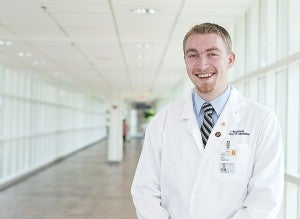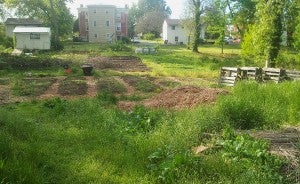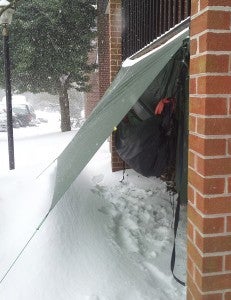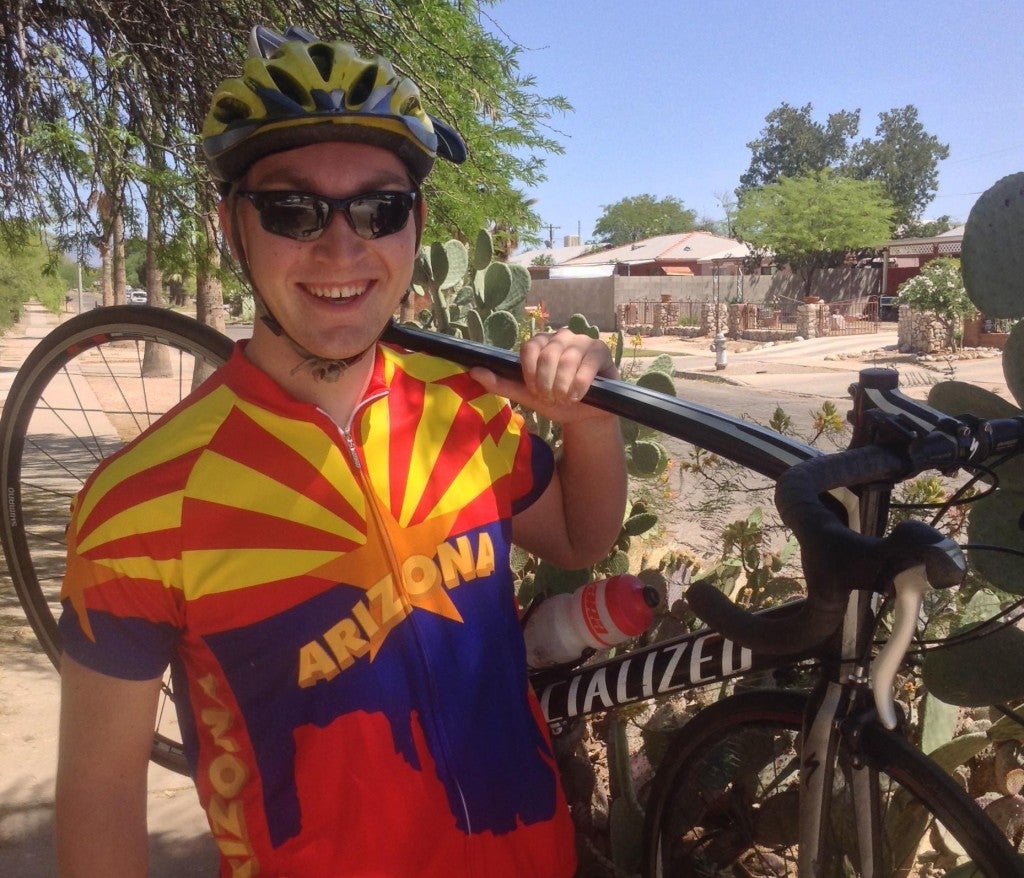University of Virginia medical students are an impressive lot. As if being in med school is not challenging enough, many pursue extracurricular activities that give back to the community. Carl Buchholz, UVA School of Medicine Class of 2019, is one such inspiring student. He feeds the homeless, sleeps outside in a hammock (yes, outside, almost every night) and bikes everywhere. (And we do mean everywhere: When he arrived in Charlottesville last fall to start med school, he assembled his bike out front of the airport and rode to Grounds down Earlysville Rd.)
During new-student orientation, Buchholz was present at a community-service panel that educated incoming students on how they could get involved. One such project was volunteering at The Haven, a multi-resource day shelter for the homeless. The Haven manages a garden, from which the bounty is used to supply their kitchen to feed the homeless. Buchholz thought that signing up for a couple of gardening shifts would be fun.
But it was not going to be that simple.
“I have a lot of experience with manual labor, so it seemed like a way in which I could help,” says Buchholz. “But when I got to the garden it was just a field of weeds and brambles. Completely overgrown. And no one else was there. I waited for a half hour and no one showed — so I left. I figured there was some miscommunication. When I came back the next week for another shift, the same thing happened — no one was there to meet me. I later received an email from the volunteer coordinator who apologized that the garden had decayed. The garden manager hadn’t been with them for three months.” The coordinator apologized and said that The Haven would remove garden shifts from the schedule until something could be figured out.
But that got Buchholz thinking. If they needed labor, he was willing to help get the garden back into shape. “I worked a few shifts and then … a couple of weeks later: I’m in charge of the whole garden!”
Getting Dirty
Since last fall, he has spent a lot of time at the two-acre garden moving dirt, building plant beds, and bringing in and organizing volunteer groups — mostly undergraduates and middle- and high-schoolers — to put the garden back together again. And the hard work is starting to pay off. “We finally got our first plantings in this spring,” he says. “We have kale, chard, onions, spinach, lettuce, garlic, tomatoes, potatoes, cucumbers, beans, peppers, and my favorite — almost a half acre dedicated to strawberries.”
The Haven serves breakfast every morning. “Knowing that,” says Buchholz, “we planned our plantings around what they would use in a breakfast setting. A lot of these are ingredients that can go into an omelet or scrambled eggs. We’ll harvest at end of summer and bring it to the kitchen and they’ll cook it up and serve it until it’s all gone.”
So what is it that Buchholz actually does in the garden? “It’s a lot of getting dirty. Initially, we were clearing, weed-whacking, pulling brambles, and moving dirt around to make the field level. Recently, we’ve been planting, building the beds, turning soil, fertilizing, working in the compost, and spreading woodchips.”
Certainly a far cry from academic medicine.
But he hasn’t done it alone. Joining him in these efforts have been dozens of medical students. “We’ve got the ‘money,’ which is The Haven, the ‘brains,’ a spouse of someone who works at The Haven and knows a lot about when and where to plant, and the ‘brawn’: the medical students. I’ve never been the brawn before, but it feels really good. My favorite part of this work is seeing the progress and seeing how many people are willing to get involved and help out — getting people out and learning the process of building a garden. This is the first time I’ve done something like this. It’s a lot of dirt to move, but it’s also a lot of food.”
In the fall, Buchholz was at the garden every morning. Now he spends four or five hours on a weekend and a two-hour shift every Monday afternoon, based on how much work needs to get done. When they’re planting, he’ll spend 10 to 15 hours a week in the garden. When they’re not, only six or seven hours a week.
Buchholz is doing a good job of balancing the dirt and the diploma.
Long Bike Rides, Sleeping Outside
Buchholz loves the outdoors as much as he loves medicine. He comes from Arizona, where he was an avid cyclist — in fact, he does not own a car. He used to race, but his favorite pastime is long-distance (100+ miles) cycling. This is the last free summer (for a while) that will not occupy Buchholz with medical training or research. As such, he’s planned a six-week, 4,300-mile trip on the Trans-America Trail, from Yorktown, VA, to Astoria, OR.
But what about the weather? He has a tarp that keeps him dry and insulation in the hammock to stay warm, even during Virginia winters when we receive two feet of snow. “I have nothing in my bedroom. Just some clothes in the closet. I don’t even own furniture. It’s liberating.”And, if you doubted his love of nature, Buchholz sleeps outside in a hammock at night. “People ask me why, and the best explanation I have is: I lived in Arizona, alone, — if I was gone all day and slept outside in a hammock at night, then I didn’t have to pay for air conditioning. I suppose I fell in love with the freedom and flexibility it gave me, too. I didn’t have to book hotels or plan around a student host’s schedule on med school interviews, I could spend the night out stargazing and not worry about riding my bike home late at night. It was new and exciting. Last October marked 500 days in a row of sleeping outside, so I took one night off and slept on the floor inside, just to break the streak at an even number. I have an apartment, but I just hang up my hammock at night between a pair of trees or on my balcony and take it down in the morning.”
Everything Will Be Fine
All this gardening, biking, and outside sleeping informs Buchholz’s philosophy on helping others. “If there’s any group of underprivileged people I identified with most, it’s the homeless population,” he says. “From biking and backpacking and sleeping in a hammock, I’m accustomed to spending multiple days away from home and enduring the elements … I start to understand what they’re going through — even if it’s just the smallest amount. I know most of the homeless people in Charlottesville by name. At the beginning of the month, I budget a certain amount of money to give. When it’s gone, it’s gone. After that, the only thing left to give is spending time and talking with them. Listening to their stories, hearing what’s going on in their lives, treating them like humans.”
Buchholz has also learned that what we think we need and what we actually need are two different things. “One of the lessons I’ve taken away from doing silly stuff like long-distance bike rides and sleeping outside in a hammock: I’ve learned ‘how things are still fine’ — even when you don’t have everything that you think you need, the essentials of food, clothing, water, shelter. When you’re not worried about shelter, because you can pitch your hammock anywhere in town and you’d still be fine … I guess my approach to life is very de-stressing. I’m not worried about me, about whether or not I’ll be taken care of. In the future, when it’s about the patient, I’m hoping this mindset will keep me ‘out of the picture’ — I’m not worried about me, or my career. If all that stuff falls through, I’ll know I’ll be fine. I just want to be present with patients, to dedicate my thought and time to them, to work through their problems.”
We wish Carl good luck on his epic bike trip, good weather (when sleeping outside), and on following up on his pursuit of being a trauma surgeon.
Filed Under: Media Highlights, Student





Comments